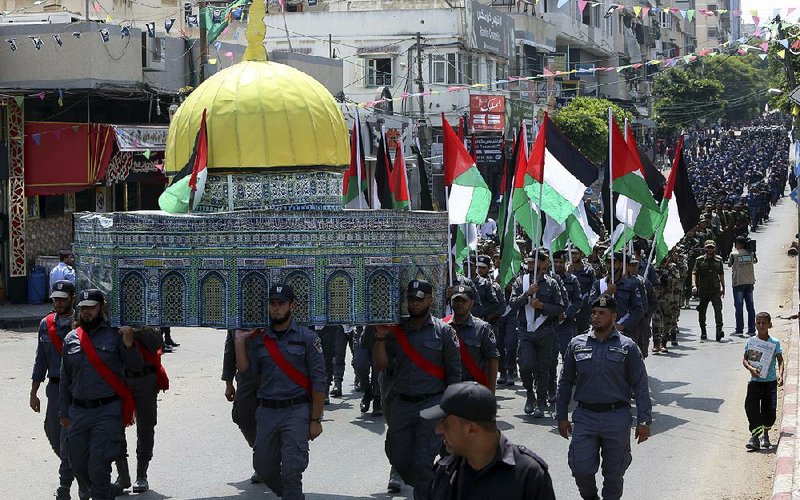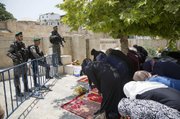JERUSALEM -- Israel removed railings and an overhead metal bridge it had recently installed near a contested Jerusalem holy site, meeting a demand by Muslim protesters and causing thousands of Palestinians to celebrate in the streets early today.
Muslim leaders said they would decide later in the day whether worshippers could return to the shrine for prayers and end a crisis that Israel hoped it had resolved by making concessions at the site.
The head of the Supreme Islamic Committee, Ikrema Sabri, had said Wednesday that worshippers would not return to the shrine until Israel removed the new railings and cameras it installed after a deadly attack there.
Sabri said that even after Israel removed metal detectors from the site, more steps were required to restore calm. He said mass prayer protests would continue until the gates of the compound were opened, metal railings and the iron bridge removed and newly installed cameras taken down.
"We will not enter the mosque until these things are implemented," Sabri said Wednesday. "Now we are awaiting the response of the police."
The demands set off the prospect of a renewed showdown ahead of Friday prayers at the site, when a large number of worshippers arrive for the centerpiece of the Muslim prayer week.
It was unclear whether Israel's removal of the railings and overhead bridge would meet the demands, but Palestinians danced, chanted "God is great" and set off fireworks early today.
Israel installed the security measures earlier this month after Arab gunmen shot and killed two police officers from within the site. It said they were necessary to prevent more attacks, while Palestinians claimed Israel was trying to expand its control over the site. The issue sparked some of the worst street clashes in years and threatened to draw Israel into conflict with other Arab and Muslim nations.
Under pressure, Israel removed the metal detectors and said it planned to install sophisticated security cameras instead.
But Palestinian politicians and Muslim clerics said that wasn't enough and demanded that Israel restore the situation at the shrine in Jerusalem's Old City to what it was before the July 14 attack.
Low-level clashes have continued in and around Jerusalem. The Red Crescent said 13 people were treated Tuesday night after being hit by rubber bullets during protests.
The continued standoff highlighted the deep distrust between Israel and the Palestinians when it comes to the shrine -- the third-holiest in Islam and the most sacred in Judaism.
The 37-acre compound, known to Muslims as the Noble Sanctuary and to Jews as the Temple Mount, has been a lightning rod for the two sides and has triggered major confrontations in the past.
Israeli Prime Minister Benjamin Netanyahu's challenge is to tamp out a wave of unrest that has triggered international pressure while not appearing to his hard-line base as capitulating.
His government has faced a growing backlash at home for what critics said was hasty decision-making and embarrassing policy reversals. Even Israel Hayom, a free daily owned by Netanyahu's billionaire backer Sheldon Adelson, denounced Israel's response to the crisis as "feeble and frightened."
In a compromise, after Netanyahu spoke to Jordan's King Abdullah II and others, Israel's security Cabinet announced Monday that in place of the metal detectors, it would employ nonintrusive "advanced technologies" -- smart cameras that can detect hidden objects. The new security system is expected to be set up in the next six months at a cost of $28 million.
Netanyahu appeared to be doubling back again Wednesday when he instructed police forces to conduct thorough inspections at the site.
Israeli police, meanwhile, acknowledged Wednesday that their forces have been preventing journalists from entering parts of Jerusalem's Old City as part of efforts to lower tensions.
Reporters have complained this week that they were being blocked from covering the unrest around the shrine while tourists have been able to freely move about the city and film with their mobile phones.
Police spokesman Micky Rosenfeld said Wednesday that "journalists are being prevented from coming in those specific areas where there have been disturbances and riots." He said it was a decision made by the Jerusalem police district.
The Foreign Press Association derided the move, calling it "a kind of innovative censorship that is surprising in a country that prides itself on press freedom."
Israel also has found itself in a new dispute with Turkey, whose leader, President Recep Tayyip Erdogan, has been among its fiercest critics. On Tuesday, Erdogan accused Israel of using security measures as a pretext to take over holy sites in Jerusalem.
Israel's Foreign Ministry responded by calling the comments "delusional, baseless and distorted."
"The days of the Ottoman Empire are over," it said. "He who lives in a palace of glass would be better off not throwing stones."
Netanyahu's office also chimed in, saying it wondered what Erdogan would have to say to Kurds and residents of north Cyprus.
"Erdogan is the last one who can preach to Israel," it said in a statement.
On Wednesday, Turkey's Foreign Ministry called the Israeli statements "arrogant."
A Section on 07/27/2017

